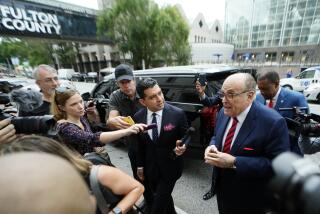Envoy Pressed U.S., Loan Case Document Shows : Hearing: The Italian ambassador is said to have urged Thornburgh not to indict BNL over Iraq aid. New questions raised about federal bank probe.
- Share via
ATLANTA — At the height of a federal investigation into illegal loans to Iraq by Italy’s largest bank, the Italian ambassador to the United States pressed then-Atty. Gen. Dick Thornburgh during a White House luncheon not to indict the bank, according to a document disclosed in federal court Wednesday.
The ambassador, Rinaldo Petrignani, told Thornburgh that charging the Banca Nazionale del Lavoro would be a “slap at the Italian government,” which owned the bank, according to an account of the March, 1990, meeting written by a senior BNL officer.
The account raises new questions about whether Thornburgh and other Justice Department officials restricted the federal investigation of BNL being conducted in Atlanta because of foreign policy considerations.
The document was disclosed at the sentencing hearing of Christopher P. Drogoul, the former manager of BNL’s Atlanta branch. He has pleaded guilty to arranging $5 billion in loans that helped finance Iraq’s prewar military buildup; but he testified Wednesday that others in the bank knew of the loans.
The Times reported Tuesday that Petrignani met with Thornburgh and other senior officials from the Justice and State departments in the spring of 1990 to express concerns about the possible indictment of BNL. After the meetings, the Justice Department blocked a trip to Rome by Atlanta investigators who wanted to interview bank officials there; ultimately, the bank was not charged.
The new document summarizes an internal BNL report on contacts between U.S. officials and representatives of the bank and the Italian government. It recounted several meetings between Petrignani and U.S. officials and provided new details of the meeting with Thornburgh. The account did not identify any White House official who attended the meeting.
According to the account, Petrignani stressed that BNL was a victim of the loan scheme. The ambassador later said to BNL officials that he had told Thornburgh that indicting the bank “would not be understood in Italy” and could jeopardize cooperation between Italian and American authorities on future investigations.
The theory of BNL as a victim was adopted by the Justice Department when it indicted Drogoul and other BNL employees in Atlanta in February, 1991. Prosecutors have said repeatedly that there is no credible evidence that anyone outside Atlanta knew about the loans.
Drogoul’s lawyer, Bobby Lee Cook, said the new disclosure “would stand the government’s case on its head.” Cook claimed the White House meeting and other contacts between U.S. and Italian officials illustrated the pressure from the Italian government to blame the loans on Drogoul alone.
Thornburgh, now an undersecretary general at the United Nations, said in a statement: “Although I met with former Ambassador Petrignani on a number of occasions while I served as attorney general, I have no recollection of discussing this matter with him at any time.”
A White House spokesman said that records there showed no meeting between Thornburgh and Petrignani at the White House.
Thornburgh also denied that he had blocked the trip by investigators to Rome, as charged in a Federal Reserve memo described in earlier stories.
Attempts to reach Petrignani, who is no longer ambassador, were unsuccessful. But he acknowledged meeting with American officials in an interview Tuesday with the Italian newspaper La Repubblica.
U.S. District Judge Marvin H. Shoob admitted the summary as evidence over objections from prosecutors, who questioned its authenticity, and a lawyer for BNL. Shoob said he felt the information was relevant to his decision on sentencing Drogoul, who faces life in prison without parole.
The judge has indicated he may impose a more lenient sentence on Drogoul if he determines that other bank officials were aware of the loans to Iraq. The judge has already said that classified CIA files provided to him by prosecutors support Drogoul’s contention that officials in Rome were aware of his activities.
Stanley reported from Atlanta and Frantz from Washington.
More to Read
Sign up for Essential California
The most important California stories and recommendations in your inbox every morning.
You may occasionally receive promotional content from the Los Angeles Times.













